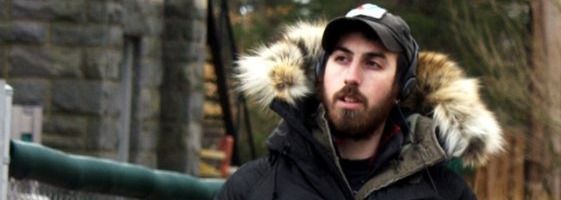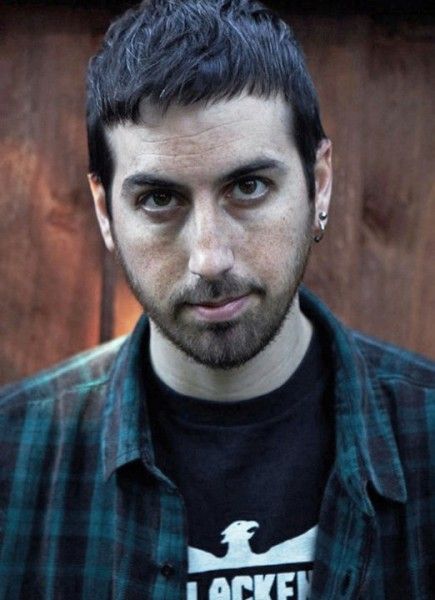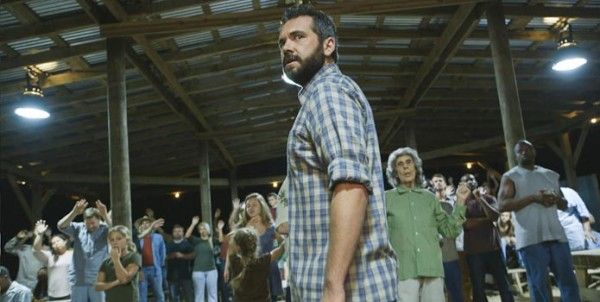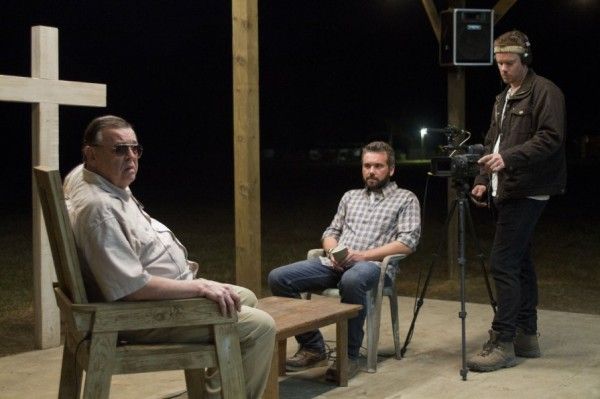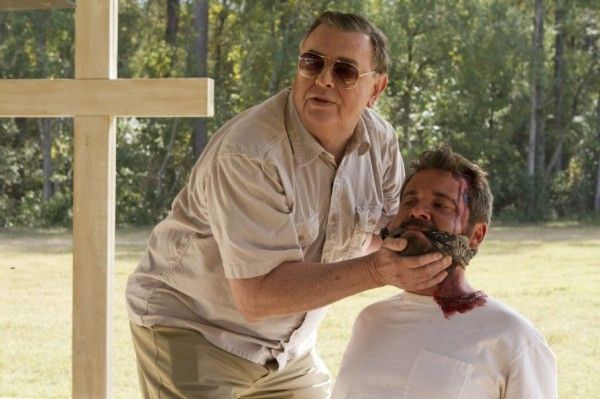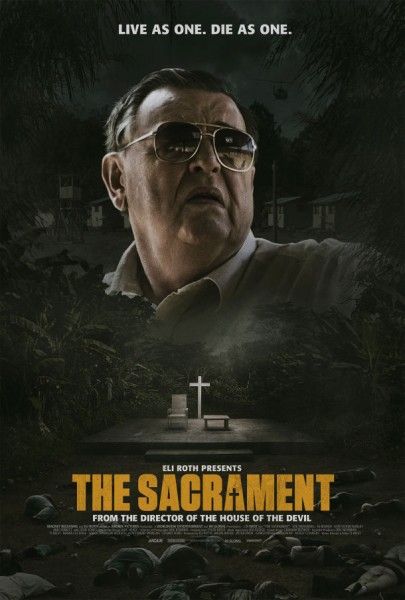Available now on VOD and arriving in select theaters this weekend is The Sacrament, Ti West's horrific look at the final hours of the Jonestown inspired cult, Eden Parish, as told through the lens of a VICE documentary. West is one of the most impressive young talents working in horror, and with The Sacrament he steps away from the tales of supernatural that have dominated his previous work (The House of the Devil, The Innkeepers) into the realm true life horrors - and it pays off. The Sacrament is arguably his finest work yet. Equal parts drama and horror, it is a deeply disturbing look at the manipulative charm of a cult leader, the desperation that drives his followers, and the cost of putting your faith in the wrong person. The Sacrament stars A.J. Bowen, Joe Swanberg, Amy Seimetz, Gene Jones, and Kentucker Audley.
At a recent LA press day I sat down for an exclusive interview with West. He talked about whether or not he considers The Sacrament a horror film, the challenges of shooting and editing a vérité film, frequent audience walk-outs, and addressing criticisms that the film exploits real life tragedy. He also talked about his upcoming Western In the Valley of Violence, taking a break from horror, plans to make a comedy, and More. Check out what Ti West had to say after the jump.
I read that you don’t consider this a horror film so much as a horrific film, is that correct?
TI WEST: I think of it as a horror movie, but what I've discovered traveling around with it is that some people don’t, because if it doesn’t have a supernatural element people don't think it's a horror movie. My response has often been “Well it's certainly the most horrific movie I've ever made", whether that makes it a horror movie or not, I don’t know, I don’t really care. For me, if I saw this movie I would be like “That was a horror movie."
OK, so you in fact conceived of and shot this as a horror film?
WEST: Yeah, I don’t think about it too much. Yeah, in my mind, yes. In the same way I think Silence of the Lambs is a horror movie. Its about a cannibal and a serial killer. It seems like a horror to me, but if it doesn’t have supernatural in it people like to call it a thriller. So I didn't really think about it either, but I'm not bothered if people say it's a thriller. It's like, sure.
I saw The Sacrament back at AFI Fest last year- great movie to see with a crowd, by the way.
WEST: Right, the end is pretty grim.
Yeah, there's lots of gasping and groaning.
WEST: We always loose a couple people somewhere around Amy and Kentucker's scene, and then the mom and the daughter- we always loose a couple people there. If they make it through that they'll make it through the rest.
Something I was surprised to see, since I saw it before most reviews were written, was the criticisms that this film is exploitative of the Jamestown Massacre, which I found really odd-
WEST: Yeah.
Especially given the fact that we've culturally adopted the phrase “Drink the Kool-Aid” as such a casual, throwaway phrase.
WEST: Yeah, yeah, yeah.
What's your response to those criticisms?
WEST: Yeah, I don't think it is. We worked really hard, certainly I did- to me, if it was the kind of movie where someone died you clapped, you know? If it had the tone of movie like that it would be very exploitative. It would be taking a real tragedy and making a fun escapism experience. I worked pretty hard, and I feel like from traveling around with this movie, that the violence in this movie is very confrontational and provocative and unpleasant and confronting in a way that real violence and real tragedy is. I think that as Jonestown for a lot of people has been reduced to pop culture, “drink the Kool-Aid”, that seems more exploitative to me than making a movie that shows how people were actually affected by this thing, how the people who drank the Kool-Aid were actually real talking people who came here to try to help better their lives and they didn't want to die, but they didn't feel like they had a choice, and then you're seeing them die in horrific ways and people dying around them.
To me that is much more in service to- even though the movie is not exactly Jonestown, it's more in service to that tragedy and reminding people that these terrible things can happen than like, a TV movie that's actually based on- to me to do a real Jonestown movie you can't do it in two hours. It's too big of story. The mass suicide is a humongous moment in the history of Peoples Temple, but it's not the story of Peoples Temple it's just the end of Peoples Temple. To do the real movie I think you have to start in Indiana, and go to Ukiah, and San Francisco, and Guyana, and then aftermath. To me it's like, if you don't do that then that's more exploitative, because you're dealing with real people and that's a little weird. I'm just using a real event as a framework to remind you that when you hear about these tragic things on the news- now be confronted with them so they're not just throwaway, so they're not just “drink the Kool-Aid”.
Totally. I agree. Gene was just telling me that because it's such a big story that your original intention was to make an eight episode series or something like that.
WEST: It was just more like I'd always been fascinated with Peoples Temple and if I'd had to the opportunity to do something like that, but I don't. So I was just like- history tends to repeat itself, here's a way for me to make a fictional cult that ends like what happened in Jonestown and show that the things that brought people to join Peoples Temple in the 60's and the 70's are still relevant today, and that tragedy that happened, something like that is not extremely farfetched today. And again, just to confront you with this is what real horror looks like.
So with this film you scratched your Jonestown itch so to speak.
WEST: Yes.
You're done with that story then?
WEST: It would be weird if someone- if HBO or something came to me like, “Do you want to do a six part miniseries?" I don't know, I'd have to think about it. Because there is an element of- it was a grim year making this movie and to go back in to it...I don't know it's sort of like that Peter Jackson Hobbit thing where it's like I don't really want someone else to do it. I still have stuff to say about it. I don't know.
In general, do you want to be a part of one of those HBO type projects where it's more of a long form series?
WEST: Yeah. After this I was either going to write a bunch of pilots, do that whole thing and try to do a TV show, or I had a comedy movie that I was going to write, and then I had a Western that I was going to write. Then I heard Ethan Hawke wanted to a Western, so I went to New York where he was doing Macbeth and I asked him about Westerns and pitched him my idea and he liked it. So I was like, “Alright, when you wrap I'm going to send you a script and if you want to do it, let's do it, if you don't I'll just take the risk." So I wrote this Western and he wanted to do it and that kind of happened very quickly and that got momentum so that's what we're going to do now. Then we'll come back around to some TV stuff.
Since you brought it up, I know you're keeping the plot and everything for In the Valley of Violence under wraps, but what was it about the Western genre that you wanted to be a part of? What do you want to bring to that genre and why did you want to play in that field?
WEST: I think that it's like, as a filmmaker I love Westerns very much and I think that it's a very unique part of American film, which I'm sort of interested in and it's also pure cinema in a way. Coming off a movie like this that's so heavily steeped in realism, even though we tried very hard to make it as cinematic as we could for this documentary style thing, there's nothing quite like someone on a horse in a big, open- I mean, it's pure cinema. I wanted to do the polar opposite of The Sacrament. So it's not a heavily- it deals with real themes and real issues in the Western, but it's also slightly stylized and in a very cinematic way and that was just something I was- the comedy movie would have been too, it's just the Western got some legs and they don't make very many of them. I saw an opportunity and I was like, “Let's go, man. Let's go make this Western." Then John Travolta signed on, and most of the other cast signed on too, we just haven’t announced it yet. Everyone's great. It's pretty cool.
Awesome I'm definitely looking forward to it. Curious, do you feel like shooting The Sacrament, which is set in the bright day time in this wide expanse, somehow prepared you to do a Western?
WEST: I don't know, maybe. No, because the Western is going to be shot in such a kooky manner that probably not. I'm eager to put the camera back on the dolly or something and not have it just be this handheld thing the whole time. My goal is to- I may change my mind, but as of right now there is not one handheld shot in the whole Western.
Let's talk about that for a minute. You make really good, classically shot films with an understanding of form and function, how much of a challenge was it for you to go into the documentary, cinema vérité style?
WEST: Well, because I love vérité documentaries so much, it was very exciting to do it and shooting it was great. It's fun to shoot it that way because it's easier, to be honest, and also you come up with clever ways to stage things in long takes. The hard part is- for instance Amy and Kentucker, that's not an easy scene for an actor and that's a four minute scene. If they mess up one things we've got to do the whole thing again, because there's no cut away.
Yeah, Kentucker said you guys did like twenty-two takes or something.
WEST: I think seventeen, but it was a lot. If there's one part of it that's not good it's like, the scene's too important to have that one fuck up, we've got to do it again. That happened a lot in the movie. There's a part where Joe runs in to the woods and he hides in the thing- it's fun when it works, but staging it out is kind of a pain in the ass. Editing it was a bummer.
I was going to ask about that.
WEST: Yeah, editing it was- that's where I was just over it. Because the subject matter was too important to half-ass it. It took a long time, and having a documentary style you can cut it eight million different ways so it just opened a can of worms of options. By the time I was done- it took me twice as long to edit. It usually takes me about two months, this took me four. It was just a grind and it was hard and it was grim subject matter. It was just a lot. It felt like a burden on me this time around. Also by the end, I was like, "I just want to do a scene where there's this shot and there's this shot and then they do this thing and the shot goes like this and it's over." As opposed to, "Eh, I've got this and some shots of the ground and we can cut to that and when she talks about the village we can cut to-" I just got worn out by that a little bit, but it quenched my thirst for doing a documentary for some time.
Aside from the Western, what's another genre or format that you really want to explore, that gets you excited and that you love?
WEST: I have that funny movie. I think that making comedies would be- I think it's very similar to horror, it's just timing. I think that the first half of The Innkeepers is kind of a comedy. I think that would be fun to do. The filmmaker in me- Western is like the pinnacle of that. It's just like every time, after I make the Western, I'll either only want to make Westerns or I'll never want to make one again. I don't want to repeat myself. I just want to keep changing it up. But yeah, I think I'll probably try to do a comedy next, like a straight up comedy.
I know you want to take a break, but you're not saying you never want to make horror again right?
WEST: No, but I'm going to take a break for a while. Next year I could change my mind on that, but I've made like seven in ten years. That's a lot and I think I've done as much as anybody really can in that short period of time as far as the amount of features and they're all pretty different and I've been pretty fortunate in the way that they've all been received, but I'm just a little worn out you know? I think it's time to do some other stuff for a while.

